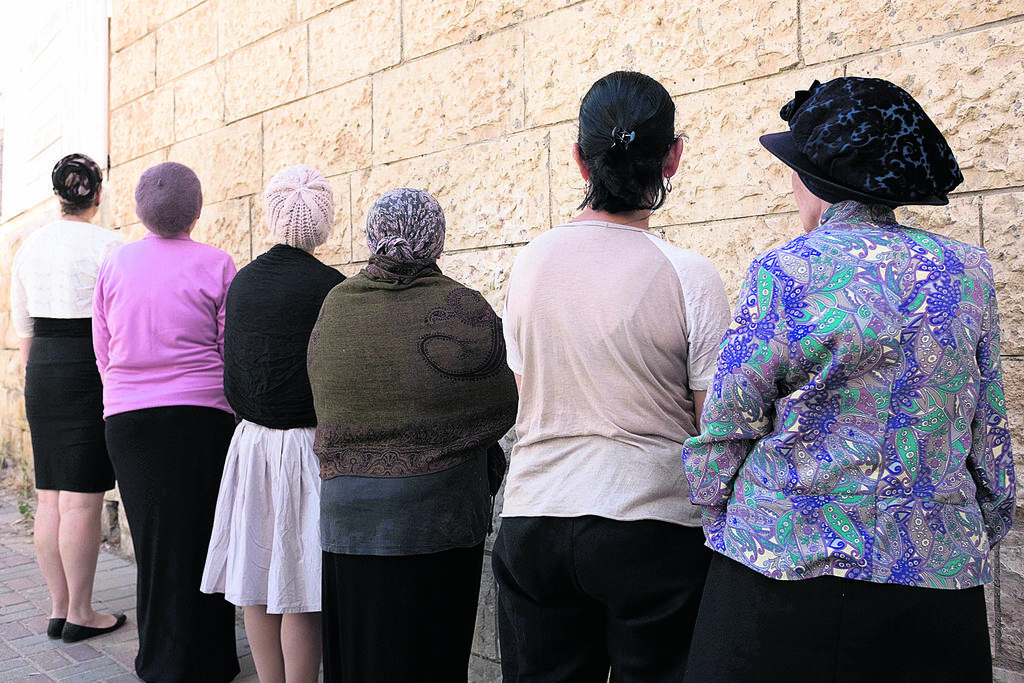Shaming is an extremely ancient social practice – so it should come as no surprise that Judaism also has a very clear policy on the matter. In Judaism, publicly embarrassing a person is forbidden and is considered a serious offense. But there’s a caveat: In practice, there are circumstances where halacha not only permits the use of shaming practices but even recommends them. The classic case of shaming with the blessing of rabbinic authority is the refusal to provide a get (Jewish legal divorce document).
Read more:
Most marriage ceremonies within the Jewish population in Israel are conducted in accordance with Jewish law. Israel has no separation of religion and state in all things concerning personal status. So, when a couple wants to separate, to be recognized as divorced, they must do it through a beth din (rabbinical court).
According to Jewish law, the man must give the woman a “get”, a divorce document. If he refuses, she cannot be recognized as divorced. The process, known as “get refusal” (sarvanut get) refers to a man refusing to release his wife for various reasons – financial, violence, etc.
Although there are some women who are defined by the courts as get refusers, the halachic status of the parties is completely different as only the man is the “divorcer” and he must grant the divorce of his own free will, whereas women who refuse to accept the get cannot prevent the man from and remarrying and carrying on with his life.
Shaming is a means of exerting pressure on a man refusing to grant a get – a procedure that had fallen into disuse for 800 years and was revived by the State of Israel. “Get refusal can happen anywhere, in any section of society. Even among very educated people who are familiar with halacha and who are aware of the consequences of not providing a gett are willing to pay the price, even if they have much to lose.” Says Dr. Aliza Bazak of the Faculty of Law at Tel Aviv University who has researched shaming against gett refusers.
“I began my research on shaming by examining halachic sources,” she tells us. “I then held conversations with dayanim (rabbinical judges) both in Israel and overseas and I researched the development of the ruling and legislation.
What is shaming get refusers actually? How is it done?
“In shaming a get refuser, the beth din allows the wife to publish the ruling compelling the man to provide his wife with a get, including his name and picture. In the case of Dr. Oded Gaz in 2016, who refused to give his wife a get for an extended period - he was shamed at the order of the rabbinical court (a body that holds judicial power in Israel). His picture was posted on social media and then made it onto media outlets. Overseas, notices and posters were displayed in large religious communities in the United States, England and France,” Bazak tells us.
How is such a decision made?
“When a couple whose marriage has hit the rocks and they present their claims to the beth din, there is a number of possibilities: The beth din can rule ‘shlom bayit’ (peace in the home) and refer the couple to couples therapy to try to save the marriage; a further option is that the beth din rules that the couple should get divorced; the third option is that the beth din can rule ‘hiyuv get’ (a rabbinical mandate to force the man to grant a divorce). Using this ruling, the beth din can exert pressure on the get refuser to provide a get by the use of financial and social sanctions and the appropriation of certain civil liberties; the fourth possibility is that the beth din rules “kfiyat get” whereby, in years gone by, a get refuser would be whipped until he agreed to provide the get. Nowadays, his freedom is curtailed and he is imprisoned.”
Between shaming and excommunication
Shaming is used at the hiyuv get stage as a tool to exert pressure on the get refuser to release his wife. Dr. Bazak claims that the halachic basis for shaming is “Harkhakot Rabeinu Tam“ (Rabeinu Tam’s distancings).
What do they say?
“Rabeinu Tam, the grandson of Rashi who lived in 12th century France, ruled that the moment the husband has been told his is “mehuyav get”, he must be treated under herem (excommunication) or ostracized. People don’t talk to him, don’t do business with him and don’t visit him if he’s sick.
However, Rabeinu Tam, in the same halachic response, clarifies that it can’t be complete ostracism that would fall within the scope of forcing a divorce, thereby invalidating it (as the gett must be given by the husband’s free will). Instead, slight ostracism should be employed, whereby the community distances itself from the get refuser (therefore known as “harkhakot” - distancings). This distancing from the get refuser denies him favors – the rights a person usually enjoys from the community to which he belongs."
Bazak says that 800 years ago these sanctions did not constitute a "closed list". She explains that Rabbeinu Tam stressed that the dayanim of each generation could add further sanctions so long as they are not so severe that they would lead to get coercion. This is how refusal to bury his relatives came about. Centuries have passed since Rabbeinu Tam penned these exclusions, and they were hardly ever used by the bati din.”
Bazak believes that “two aspects of change in modern life are responsible for the increase of the use of harkhakot: The first development is transport. In the past, when a get refuser was ostracized from his community, it drastically affected his life. Relocating from where he lived to somewhere new where no one knew him was very complicated. Modernity has made it much easier for a get refuser to move on. The development of transport allows a person to leave and go somewhere else where no one knows him and he won’t be ostracized. He can even get there rather quickly and in relative comfort.”
“The second factor for ostracization’s decreased efficiency in the modern period is the place of society in private life. In modern times, the power of society has diminished and ideas about personal development and individualism have become entrenched in all areas of life. In law, we battle to protect the rights, dignity, liberty and welfare of the individual. In such a society, social pressure has less influence over people who rebel against norms that people may even respect and admire.
Return power to society
Things changed once again after many years: “Toward the end of the 20th century, 800 years after Rabeinu Tam’s harkhakot, new sanctions - based on the harkhakot, but not replacing them - were added onto old” she explains. “The initiative for legislation came from within the rabbinical court system from chief rabbis, Avraham Shapira and Mordechai Eliyahu, director of the batei din along with further dayanim in light of the late lawyer, Dr. Yaakov Weinroth’s doctoral thesis calling to revive Rabeinu Tam’s harkhakot.
“In 1995, Israeli law imposed sanctions based on Rabeinu Tam’s Harkhakot – dressing the ancient regulations in 20th-century garb, making them relevant once again. These sanctions allow a beth din to impose various restraints on the get refuser: They can prevent him from leaving the country by use of a stay of exit order, deny him a new passport, deprive him of his driving license, prevent him from earning a living or working in any position in either the public or the private sectors, prevent him from getting a new checkbook, blacklisting him at the bank as a restricted customer and curtail the rights of an imprisoned gett refuser who is imprisoned. “
What remains of Rabeinu Tam’s original harkhakot?
“Analyzing the sanctions, we see that they have maintained the two aspects of the ancient sanctions: isolating the get refuser and shaming him – limiting the freedom of movement afforded him by modern life. They make his mobility difficult by using a stay of exit order, confiscation of his passport and driving license, thus reinstating society’s power. He can’t work. He can’t earn a living and he is blacklisted as a restricted customer at his bank, thus returning the circumstances of a modern gett refuser to those of his Medieval counterpart.
I believe that’s why they’ve been so successful. The old and new sanctions are admittedly not cut of the same cloth. The former are based in halacha, the latter in Israeli law. But the combination does the job and they’re frequently used by the batei din in cases requiring hiyuv get.”
The 2016 rabbinical ruling regarding Oded Gaz was the next milestone in solidifying practical aspects of shaming: The Beth Din Hagadol (Rabbinical Supreme Court), under the auspices of Rabbi David Lau, ruled in favor of shaming Dr. Gaz. “The beth din allowed his wife to publish the name and picture of the get refuser and approached his places of employment calling for his dismissal and he was excluded from all religious activity” explains Dr. Bazak.
Dr. Gaz was working at the time as a lecturer at the Institute for Advanced Torah Studies at Bar Ilan University and was a postdoctoral fellow in Physics at Tel Aviv University. With the shaming, he fled the country using a forged passport. He was eventually apprehended and arrested in Belgium. The modern spread of information makes the world a global village, in a way a single community. The get refuser is thus returned to the circumstances of a get refuser in the Medieval period. Whereas before the shaming, he could fly somewhere where he wouldn’t be shamed, he now has nowhere to go.
Pros and cons
Dr. Bazak lists a number of advantages of shaming get refusers: “We’re bringing back a religious ruling that modern digital language had made anachronistic and we’ve made the practical aspects relevant and effective. Shaming also reflects society’s values towards get refusal by ejecting it. It also works as a deterrent for potential get refusers who see how difficult shaming is for get refusers.”
“A further advantage is that shaming helps the weaker elements in society. Women generally have less money and a lot less power than men when they get to court. In far too many cases, we see that the husband owns most of the assets. The wife raises the children and works part-time, finding herself with weaker representation in divorce proceedings. Shaming balances this out. Shaming doesn’t require money. The wife simply posts the information on social media. She also isn’t abrogating any lashon hara (libel) rules and she isn’t being publicly embarrassed. Shaming rights wrongs and pressure exerted by society is immense.”
But is shaming really effective?
It’s complicated. “I’m sorry to say that, for now, shaming isn’t effective enough in Israel” explains Bazak. “In the case of Oded Gaz, it didn’t help. He left the country, hopped to Cyprus, Ukraine, England and was eventually caught in Belgium. There was concern that he would never give a get. When he was being arrested, he told one journalist that 5,000 lashes wouldn’t make him give a get.”
Are there any dangers or negative aspects to the practical side of shaming?
“When we first hear about shaming, it sounds very exciting, but the deeper you dig the more complex it becomes. Does publicizing details always help the victim? We always want it to help the victim. Shaming also has its disadvantages and each case needs to be addressed on its own merit. We’ve recently seen that shaming can even lead to suicide. We’re also placing a heavy burden on society, and we believe in society, but society isn’t always decent. Medieval masses would flock to the town square to see a man hanged. Shaming is virtual hanging in the town square. We want to place our trust in society, but society has its faults.”
She outlines a further drawback to shaming in that it can actually exacerbate get refusal in that it can bring the get refuser to the point he has nothing to lose: “His name is mud, he’s ostracized from society, he doesn’t have a job, his wife isn’t with him anymore. He may well feel he has nothing to lose and he’ll dig his heels in.”
“Another disadvantage is that we are accustoming the public to using a destructive tool with far-reaching ramifications. The public may not be able to distinguish between shaming based on judicial ruling and shaming that society thinks should be used to right various wrongs that arise. Even if the public can make this distinction, the very use of shaming numbs society to its negative aspects.”
Shaming is more effective abroad
In the case of Oded Gaz, where Interpol got involved, the story didn’t end with him granting a get. As the international hunt for Gaz was underway, the beth din in Haifa dealing with the couple advanced to the next stage and the hearings led to nullifying the marriage.
“The beth din found a significant fault in one of the marriage witnesses (Jewish law stipulates that marriage ceremonies require witnesses). The marriage was annulled and the woman became single again” Bazak explains. “It wasn’t shaming that ended the marriage, but rather nullifying the marriage. Overseas, however, shaming is much more effective. It works there.”
 Dr. Aliza BazakPhoto: Courtesy
Dr. Aliza BazakPhoto: CourtesyMaybe it mainly says bad things about Israeli society? Perhaps we’re indifferent to unethical behavior?
“That’s an interesting approach. I think we just need to learn how shaming can best work in Israel. Maybe we should look into why it works outside Israel and here it doesn’t. In the Diaspora, the get refuser is dependent on the services of the community in many spheres and so will feel more threatened by shaming. I don’t know if people overseas are better. I’ll defend us a bit by saying that they are better at listening and, for fear of assimilation, feel a stronger sense of affiliation to the community in which they live. It’s existential for them. In such a community, the get refuser will feel trapped and shaming will be more effective. “
But Israeli society is definitely on board and is aware of the issue. I think a lot of dayanim and organizations do all they can to make it work
“Perhaps in addition to assessing the case of each get refuser, we should assess the community to which he belongs. To gauge whether shaming will be effective in each case, we must decipher the factor that would make shaming intolerable for a get refuser. It might be compelling huge financial payments to the wife (as proposed in a bill last year) or in some other way. I’m optimistic. Shaming is a very strong tool and we should carry on using it. With God’s help, it will bring about the results we all want.”







